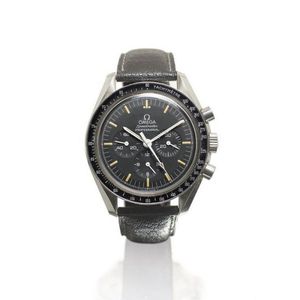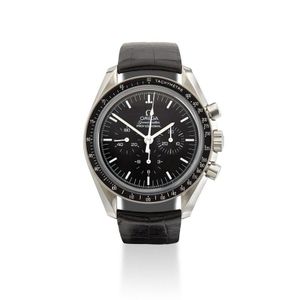Omega Speedmaster Chronograph Wristwatch with Moon Inscription
You must be a subscriber, and be logged in to view price and dealer details.
Subscribe Now to view actual auction price for this item
When you subscribe, you have the option of setting the currency in which to display prices to $Au, $US, $NZ or Stg.
- Bezel - On a clock or watch, the bezel is the metal frame into which the watch or clock glass is fitted. In clocks, the bezel may include a hinge and a flange, in effect a door to the face of the clock. In jewellery the bezel is a band of metal with a projecting lip that holds the gemstone in its setting.
- Movement - The technical name for the workings of a clock or watch, and does not include the dial or case.
- Chronograph - A chronograph is a watch that also incorporates the features of a stopwatch, to measure elapsed time. Most chronographs are operated by two buttons, one to start and stop the chronograph second hand, and the other to return that hand to the starting position.
- Moon Dial - If we imagine life in the 17th century, the only source of ascertaining the time of day or night would have been the local church or municipal clock striking every quarter hour, and able to be heard by all in the village. In England, when longcase clocks became popular and more affordable in the late 17th century, the function of timekeeping and source of time was moved to within the home.
An additional feature on some longcase clocks was to display the phases of the moon, that is the new moon, the full moon and the waning moon over the lunar 29 ½ day cycle. This information was important for farmers for working out cropping schedules; for travellers to know the amount of moonlight on a night they planned to travel; and for those who lived near the sea required knowledge of the tides.
Where included, the moon dial is usually in the form of a disc incorporated into the main dial plate, usually in the arched top section. The lunar cycle starts with the new moon displaying, which is a dark night sky and no man-in-the-moon face being displayed, and then progresses to the full moon face showing on the 15th day of the lunar cycle, and back to no face displaying as the moon wanes. Most lunar dials are partially concealed on each side of their opening in the main dial plate by semi-circular "humps" that allow the painted face to emerge slowly just as the real moon goes out of and back into the earth's shadow.
Nowadays, details of the lunar cycle is published in diaries, almanacs, and newspapers and although some modern longcase clocks are still manufactured with working moon dials, they are more for decoration than for use. - Baton Numerals - A watch that instead of displaying numerals on the face, displays a marker in the form of a baton, or lower case letter "L". Since the baton-like marks are not numerals, the feature is also called baton markers, baton indexes and baton indicators.
This item has been included into following indexes:
Visually similar items

Omega A stainless steel chronograph wristwatch with registers mvt 48338639 case 1450022 3450022 Speedmaster circa 1990, cal. 861 manual winding movement, fully jewelled, black dial, luminescent baton indexes, three subsidiary dials for constant seconds, 30

Porsche design, stainless steel P'6000 chronograph wristwatch, Ref. 6605.41, c. 2000, automatic movement, black dial with luminous baton markers and luminous hands, three subsidiary dials, tachymeter scale, aperture for date and day, dial, case and movemen

Panerai, a stainless steel automatic cushion-form wristwatch with date ref Op 6524 BB1005893 C1278/1500 Luminor Gmt PAM063 circa 2001, automatic winding movement, fully jewelled, mono-metallic balance, matt black dial, applied luminescent Arabic and baton

Bulgari. A stainless steel automatic wristwatch with GMT and date case L02739 Diagono Professional GMT 40S circa 2005, automatic winding movement, fully jewelled, black dial with applied luminous filled bullet hour markers and Arabic 12, polished baton han
